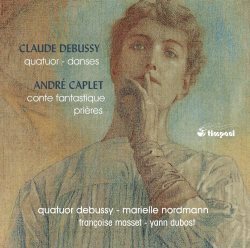| 
|
Claude DEBUSSY (1862-1918)
String Quartet In G Minor [25:32]
Deux Danses, "Danses Sacrée et Profane" [9:54]
André CAPLET (1878-1925)
Les Prières [9:37]
Conte Fantastique [17:17]
Marielle Nordmann (harp: danses, Prières, conte)
Francoise Masset (soprano: Prières)
Yann Dubost (double-bass: Prières)
Quatuor Debussy (quartet)
rec. December 2012, Espace Monod, Vaulx-en-Velin
TIMPANI 1C1207 [62:50]
The pairing of Claude Debussy with André Caplet is apposite. The younger composer was influenced by the elder, becoming his assistant and completing some of his orchestrations, an example being Le Martyre de Saint Sébastien. Caplet was also a conductor, having studied at the feet of Artur Nikisch in Berlin. He was instrumental in promoting Debussy’s music, on both sides of the Atlantic, whenever possible. Like Debussy, Caplet died young, aged 46, in 1925 as a result of pleurisy, a complication of gassing, contracted whilst on active service during the First World War.
The Debussy Quartet in G minor needs no introduction. Frequently recorded, it has become one of the staples of the quartet repertoire. The performance here by the eponymous Quatuor Debussy is impressive. The players have this music at their finger tips, delivering a reading of Gallic charm and rhythmic exactitude. They respond well to the subtleties and nuances within the music, and are sensitive to dynamics and tonal shadings. Its cyclical nature, due to Franckian influences, is evident in the logical approach these players bring to the score.
The remaining works all feature the harp in a prominent role. Debussy was approached by the firm Pleyel, who were working on a new chromatic harp. The composer’s response was these two "Danses Sacrée et Profane". Although the Pleyel venture wasn’t a success, the Dances have remained in the instrument’s repertory, as they can be played on the traditional diatonic harp. The two pieces form a stark contrast. The Sacred is slower with modally inflected harmonies. Debussy drew his inspiration from the music of the Greco-Roman period. Profane is a waltz in D major in a quicker tempo.
Caplet drew inspiration from his strong Catholic faith. The music itself has an improvisatory and diaphanous quality. Pure, sparse with an economy of texture, Caplet stamps his work in a deeply personal way. In Les Prières, a work for harp and strings accompanying a female voice, this devotional aspect is prevalent. Composed whilst serving on the front-line, the composer pours out his soul in these three lyrical ‘prayers’; The Lord’s Prayer, Ave Maria and The Apostles' Creed. Here, he reflects, from the trenches, on the human predicament. They are beautifully sung by the soprano Françoise Masset.
The Conte Fantastique is one of Caplet’s more well-known and frequently performed works. This is a 1923 revision of an earlier work, Etude Symphonique (1908) for harp and string orchestra. Here it is adapted for harp and string quartet, with the double-bass thrown in for good measure. It is based on Edgar Allan Poe’s Mask of the Red Death. Caplet was attracted to this unusually gruesome story in which a Prince holds a reception in his castle. This is interrupted by the chiming of a clock. On the stroke of midnight the jolly recommences and the Mask of the Red Death appears, slaying the throng. This minimalistic work, bordering on atonality, uses scintillating string writing and harp effects, such as glissandi, to evoke an eerie atmosphere. At one point the harpist is required to rap on the sound-board to represent the stroke of midnight.
These are compelling performances. The acoustic of the Espace Monod, Vaulx-en-Velin is sympathetic, and the balance between the instruments and the excellent Françoise Masset (soprano) is ideal. Whilst I have always enjoyed Caplet’s Conte Fantastique and Les Prières in the 1992 Ensemble: Musique Oblique recording (HMA1951417), the more immediate and opulent sound that this new Timpani recording affords, now replaces the earlier version for me.
Stephen Greenbank
 |
 |
|



 All Nimbus reviews
All Nimbus reviews








